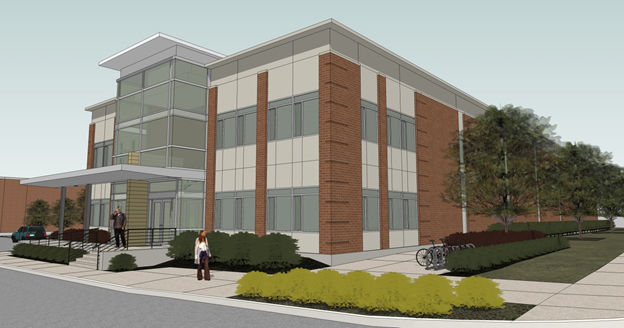Construction to begin on bioprocessing laboratory
A computer rendering of the Integrated Bioprocessing Research Laboratory, which will be in operation by the summer of 2016 and focus on biofuel research.
Nov 6, 2014
Last updated on May 11, 2016 at 12:14 a.m.
Construction of a new Integrated Bioprocessing Research Laboratory should be underway by the middle of the month, said Hans Blaschek, director of the new facility and assistant dean for the College of ACES.
The project, funded by the state of Illinois’ Capital Development Program, will cost somewhere between $22 and $25 million, Blaschek said. The state approved the project in 2008, but as a result of the recession and approval issues concerning other legislative bodies, it had been put on hold until now.
The laboratory will be constructed on Pennsylvania Avenue, connecting to the existing Agricultural Bioprocess Laboratory, which is around 100 years old. It is expected to be finished and operational by the summer of 2016, Blaschek said.
Bioprocessing involves extracting products with a higher value from plants, said Neal Merchen, associate dean of research for the College of ACES. These products could include important chemicals, nutrients or bioactive compounds, which can then be used for pharmaceuticals or nutritional supplements. Biofuel production will also be a focus of the facility.
Get The Daily Illini in your inbox!
“Most of the research that will take place in that building will revolve around developing processes for the production of biofuels from agricultural products,” Merchen said.
The facility will include a large “high bay” area where research and development will take place, as well as classrooms, office space and an analytical laboratory.
“I think the really unique thing about the facility is the scale of the facility,” Merchen said.
Its scale will be larger than “the scale of a laboratory bench,” but smaller than an industrial-scale effort.
“There are very few, if any, facilities that are designed to meet somewhere in between those two extremes,” Merchen said.
The facility will be able to test whether scaling a laboratory-scale project up to a larger scale is feasible and provide proof of concept.
The facility will also allow faculty and company representatives to test their technologies and access different types of utilities, such as different types of power, voltages and gas. This is possible because everything is at a scale where it can be moved around, making it more modular and easy to use, Blaschek said.
There will be a fee schedule set up for company use, allowing the facility to be feasible from a business standpoint and produce revenue for the University, Merchen said. There will also be a program where faculty will be able to submit proposals to use the facility and carry out their own project.
Students will be able to benefit from the laboratory as well through workshops where they can be involved with the state-of-the-art equipment.
“Educationally, I think the facility would definitely boost the knowledge,” said Nate Wells, senior in ACES. “I think some things that are discovered there should be open source, and that knowledge should be distributed.”
Blaschek said in the long run, the facility will help to create jobs.
“We’re creating new technologies around which companies can be based,” he said.
Merchen said the facility will be beneficial to the University in several ways.
“I think it will facilitate a good deal of partnerships between the world of private enterprises and a public institution like the University of Illinois,” he said. “I think (the facility) also helps put the University of Illinois in the position to be one of the national and maybe global leaders in the use of bioprocessing.”
Eric can be reached at [email protected].






